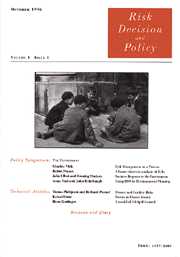No CrossRef data available.
Article contents
Continuation rights, precautionary principle, and global change
Published online by Cambridge University Press: 30 October 2001
Abstract
Implementing a Precautionary Principle can mean different things to different people. Policy analysts may believe that finding a quantitative approach to the Principle would remove ambiguity over fundamental issues. We demonstrate that one approach to quantifying the Precautionary Principle does not necessarily solve what we call the ‘continuation framing problem’. That problem is based in the competing perspectives of stakeholders when they view their own activity as the status quo and a change in that activity as causing irreversible costs. Even a shared analytic framework, here that of real options analysis, does not remove the need for political decisions about property rights in differing uses of the atmosphere.
- Type
- Technical Article
- Information
- Copyright
- © Risk, Decision and Policy, 2001


